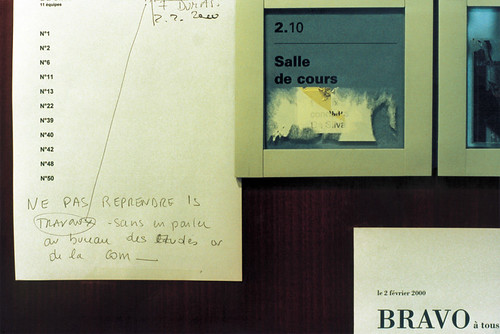 It is part of the aim of linguistic studies to improve both literary perception and the techniques of describing what is perceived. I have an uneasy sense that of late they are being more successful in this last.
It is part of the aim of linguistic studies to improve both literary perception and the techniques of describing what is perceived. I have an uneasy sense that of late they are being more successful in this last.-I.A. Richards, "Variant Readings and Misreadings," in
So Much Nearer: Essays Towards a World English Richards here, at a large conference at Indiana in 1958 (attended by behavioral scientists like John B. Carroll, linguists like Roman Jakobson, and literary critics like René Wellek) on style, is in many ways lamenting the failures of a movement he started. In a post last week or so I said that one of the things Richards did that was so remarkable was give tools to literary study. Names like "vehicle" and "tenor" are the "techniques of describing" that he here thinks can actually be a detriment to the cultivation and education of that other thing, that thing for which he originally developed those tools, "literary perception." In other words, Richards' approach to literature produced so much by finally allowing specific tools to be created for the literary critic, that these tools overtook the aim that governed the approach in the first place. We are able to describe literature, but unless this increases literary perception, the tools are pointless.
The question is, of course, what exactly does Richards mean by "literary perception?" Roughly, summing up the concerns of
The Meaning of Meaning,
Principles of Literary Criticism,
The Philosophy of Rhetoric,
How to Read a Page,
So Much Nearer, and other works which, once actually read (by which I mean, actually picked up and looked at, instead of dismissed as a part of that ugly New Critical heritage we have not yet managed to kill off) will over and over again make this point clearly, literary perception is the ability to understand what a highly complicated (i.e. literary) statement is communicating, and, indeed, the different ways in which it possibly could be successful (or not) in this communication. And it is an ability in the sense that it is what remains necessary to achieve this understanding quite quickly, almost as soon as one really perceives and grasps how the statement is physically made up--the shapes of words on the page and/or their sound, for example. The process of studying language and its structures in literary criticism is first and foremost to cultivate--and to allow others to cultivate--a practical ability in negotiating not only just what, but also
how a statement means. Without the cultivation of this ability or perception, the descriptive tools that allow us to talk about this perception and guide it along lose their purpose--or rather gain a purpose that is different.
Now, what is slowly being made clear in the above is that there are two ways to conceive this literary ability or perception. First and foremost, there is a conception that is narrow and remains close to what I have just described as Richards' notion of it: it is indeed a lot like perceiving the object one will become aware of, like one perceives a forest or rocks or the kitchen table, only it usually takes the form of text on a page or screen, and words in the ear or coming out of a speaker. It is an ability that is more constitutive of experience in general, in the way that becoming numb in the hand will take away something about our experience of the kitchen table (in that we cannot feel it). And then there is a conception that conceives this ability as a sort of skill: this, I'll claim, is closer to the rest of the New Critics' notion (starting with Empson) as they appropriated or worked off of Richards' work, and, as we'll see, in many ways informs certain notions of the role of criticism even to this day. Ability as skill: this is an ability that is not so related to experience in general, but is like a certain dexterity when presented with a certain problem. It is something that does not bear upon the experience of something in the first place, but in fact prepares one for the experience outside of that experience. It is an ability that can be practiced, not in every instance with the new influx of experience, but can be separated off and engaged in while one is not directly experiencing. As such, it transcends any particular experience, or does not remain an immediate response to that experience. It has its being beyond experience, and therefore remains more like a set of knowledge about how to use certain tools when confronted with a particular type of experience.
Literary perception on the one hand as awareness, as the condition of an experience or as a sense, as perception proper, and on the other hand, literary perception as a skill, as a separate talent, as a virtuosity: it is obvious the extraction of the latter sense of "perception" from the former produces more and more description through technique. In other words, thinking of literary perception as skill allows the proliferation of techniques of description and the cultivation of an ability to use these techniques, but severs its connection to literary perception as the thing that makes these techniques possible and which itself needs to be cultivated. This, I'll claim, is the full import of what Richards is saying above.
However, thinking of literary perception as skill does (as we said anything which used description at the expense of literary perception itself would) gain a different purpose, or refigure the original purpose, in the sense that it opens up an opportunity for something else. Literary perception, when understood as a skill, becomes less and less about understanding a statement that is
communicated, and more about understanding a statement that is
written in a book, or is, in short, a literary
object.
In other words, Richards has a theory of literary perception that remains highly based on a notion of communication. But exposing this dependence of Richards upon communication also shows us that communication is precisely what allows him to keep literary perception away from being a sort of special skill in deciphering a literary object. Why? Because--if I can speak so broadly and loosely--understanding communication is based not on recognizing form, but on clarifying syntax and rhetoric.
I'll try and bring out what I mean. Coming to a statement with a an increased skill in being able to deal with statements of that type--in short, the skill-model of literary perception--turns that statement precisely into what can be unlocked by means of those skills. At a certain point, it matters less what the statement is saying than that it is of the type that the virtuoso can deal with--i.e. that it has a certain form. On the other hand, coming to the statement so as to become aware of it--coming to it in a way that tries to understand the statement in terms of what and how it can mean, why it orders itself in these particular units of meaning and, more importantly,
what the result is of that order in how much awareness it produces--this does not make the statement a reflection of any preexisting ability. The statement is made clearer and clearer in the moment through repeated attempts to become aware of it and make it mean, and this makes it depend less on what
recognizable type of statement it is--since once it is recognized (or is near enough to recognition), it is understood.
The difference in the resulting forms of cultivation--i.e. in what the aim of cultivation becomes--is very clear. In the case of literary perception as skill, one mainly thinks in terms of inculcating more and more background: the problem is one of amassing tools that can be deployed strategically when the time is right. In Richards' model of literary perception (perception as awareness) one is focused on how the forms of this perception will modify the statement, rather than unlock it. (In a way Richards' model is precisely the process of critically accounting for the skill-model.) But the point is that here the focus will be on the processes of clarifying as intrinsic to the act of perception and awareness, or, better, on trying to develop skills that will allow that clarifying act through repetition happen more smoothly.
The downside of the latter model is indeed that it is so focused on communication, and resists gaps in communication that might only be able to be picked up through recognizing form (or formlessness). But it strikes me that the state of literary studies has so conceived of the cultivation of its literary perception in terms of skill that it has forgotten, often, how to understand and especially to teach communication (in literature and in general: obviously here there is an argument for composition being a major part of literary study here, though I hope that it is clear composition might not just be a detour from that study but would enrich it by tempering efforts to reduce its object, as I'll point out in a moment). In forgetting how to understand literature as communication, its object has become more and more restricted, precisely as the amount of communication has grown unbelievably and the demands for effective communication are very clearly higher than ever. The relation between literature and the demands of communication becomes hazy at best, and this can be seen merely by looking at who actually teaches the analyzing and composition of statements (not professors of literature, as Gerald Graff in the summer of last year pointed out well in an MLA presidential column). Moving back to the communications model (and this was done quite well through linguistics and semiotics, which I think produced one of the most successful subfields of, indeed,
literary study, narratology) while still preserving some of the results of the skill-model, might be profitable. But I do think that this has to happen at the expense of a notion of cultivation which does place the emphasis upon skill
as opposed to awareness: while this allows authority to be established, it reifies our object--in short, it keeps people out of a process that has to internally be amenable to expansion--in fact, extraordinarily so. Skill, remember, can be precisely
the result of a cultivation of perception in Richards' sense, as well. In fact this might be the only way that one gains skill in the first place (so say those who think in terms of skill: practice and knowledge is what is necessary). So I'm not arguing against skill (or the study of form or indeed the study of literature that is most object-like): I'm just trying with Richards to displace its primacy. Skill as a
result of a cultivated ability to engage in clarification: this might bring literary studies towards at least apprehending its unreflective dependence upon the skill-model itself. We are perhaps still too suspicious of literature as communication, in other words: we might no longer be able to get away with thinking it (and Richards' conceptions of it), in whatever form this still happens, as wholly naive.
 I just attended the last of this year's Gauss Seminars in Criticism, where Eleanor Kaufman was giving a amazing series of lectures on "The Incorporeal in French Phenomenology." Her task was to think the being of objects or things, but without projecting thought or intention upon the thing (to speak loosely). In other words, she wanted to think being without thought as it takes place in objects, in the sense that being has always (especially in Heidegger, though he also does the most to expose this dependence and criticize it) been what thought can grasp, despite the fact that there were many objects having their being (like the whole cosmos) before thought. In doing so, she returns to the phenomenology of Sartre, in an amazing work of recuperation that sees his phenomenological experiments--especially his work of constructing unbelievably brilliant examples, which rightly are famous--as different at times from his existential philosophy.
I just attended the last of this year's Gauss Seminars in Criticism, where Eleanor Kaufman was giving a amazing series of lectures on "The Incorporeal in French Phenomenology." Her task was to think the being of objects or things, but without projecting thought or intention upon the thing (to speak loosely). In other words, she wanted to think being without thought as it takes place in objects, in the sense that being has always (especially in Heidegger, though he also does the most to expose this dependence and criticize it) been what thought can grasp, despite the fact that there were many objects having their being (like the whole cosmos) before thought. In doing so, she returns to the phenomenology of Sartre, in an amazing work of recuperation that sees his phenomenological experiments--especially his work of constructing unbelievably brilliant examples, which rightly are famous--as different at times from his existential philosophy.







